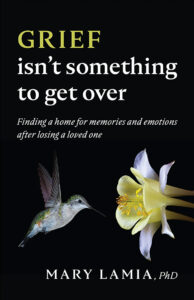In her new book, Grief Isn’t Something to Get Over: Finding a Home for Memories and Emotions After Losing a Loved One, Dr. Mary Lamia (Lah-Mee-ah) combines psychological insights with case examples from her decades of work with grieving clients that illustrate how loved ones who have died are always alive within us — regardless of spiritual beliefs.

Memorial Day is a U.S. holiday of remembrance, reflecting on the meaning and importance of those who have sacrificed in the line of duty. The day provides us with a moment where the living can honor those who have left us.
Although Dr. Lamia agrees that it may be awkward to talk about the loss of a loved one — at least in the culture we live in — she illustrates that “Grief has a rich meaning.”
She offers five talking points to help readers better understand moments when their grief is activated on this holiday or in any given moment:
- Casualties of War Don’t End When the War Ends: The traumas of war may be re-activated by the holiday that serves to honor those we have lost. Similarly, the grief we experience from losing a loved one is reactivated throughout our lives by thoughts, situations, places, circumstances or dates.
- Remember Those with Unacknowledged Losses: Let’s also use Memorial Day as a vehicle to remember losses where people or their loved ones (not yours), have nonetheless suffered loss and experienced grief from lifelong injuries or illnesses.
- Capture Collective Memories: Collective grief applies to veterans honored on Memorial Day as well as other situations that may not include physical death but loss in some way, such as members of a community whose homes have been destroyed by a wildfire, or the medical professionals who have coped with seeing those die around them because of the Covid-19 pandemic.
- Acceptance and Closure Do Not Apply to Loss: The misguided but common notion that grief is time-limited leads many people to believe that in order to achieve some kind of closure they must relinquish their attachments and “accept” their loss. Instead, we must learn to accept our feelings no matter how long the process takes — even if it is over years.
- Sensory Memories Can Rekindle Your Feelings of Loss: A mere gist of a memory, activated by an image, a smell or a song, can make us aware of feelings and sensations associated with a lost loved one, even without our conscious awareness of why we are experiencing those feelings.
Offering practical coping strategies and questions for reflection throughout, Grief Isn’t Something to Get Over leaves the bereaved with precisely that: Hope.
“Hope does not extinguish grief,” Dr. Lamia said, “but it can take our memories of those we have lost with us to better or different future places.”
Mary Lamia, Ph.D., strives to convey an understanding of emotion through her practice as a clinical psychologist in Marin County, and her work as a professor at the Wright Institute in Berkeley. She is the author of five previous books, including Emotions! Making Sense of Your Feelings; The Upside of Shame; The White Knight Syndrome; and Understanding Myself: A Kid’s Guide to Intense Emotions and Strong Feelings.